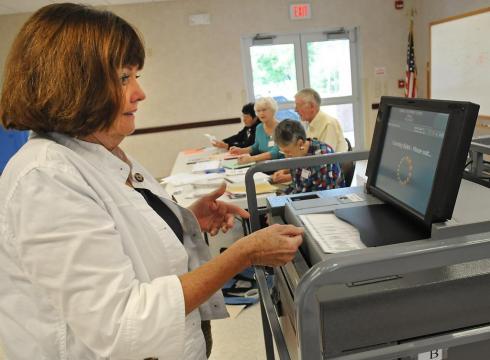
WASHINGTON – The federal agency responsible for inspecting voting equipment said Thursday that a ballot scanner used in several key battleground states can freeze up without warning, fail to log errors and misread ballots.
The U.S. Election Assistance Commission said the ballot reader, made by Omaha-based ES&S, is not in compliance with federal standards. And while it's the first time the 8-year-old agency has taken such a step, it falls just short of decertification — a move that could force election officials to abandon the machines on the eve of the 2012 presidential primaries.
The DS200 optical-scan system is designed to read paper ballots fed into the machines by voters themselves at their precincts. It's used in all or part of Florida, Illinois, Indiana, Ohio, New York and Wisconsin.
The commission found three problems with the machines:
•Random screen-freezes that prevent ballots from being fed.
•Failure to log errors in a file that would let election officials know of problems.
•Skewing of ballots as they're fed into the machine, making votes cast in some parts of the ballot unreadable.
ES&S responded in a statement to customers Thursday. "While we may not necessarily agree with all of the findings or recommendations within the report, we have nonetheless pledged our full cooperation."
The commission first learned of the problems in a story in The (Cleveland) Plain Dealer, which reported last year that 10% of the voting machines in Cuyahoga County, Ohio, had failed a pre-election test.
Jane Platten, the Cuyahoga County elections director, said the county had to switch to shorter ballot pages to fix the problems, and later reached a $208,197 settlement with the company. Later fixes offered by ES&S also led to system freezes, so the county went back to the previous, flawed software as "the devil we know," she said.
Candice Hoke, a Cleveland-Marshall College of Law professor and an expert on voting equipment, credited local election officials for the rigorous testing that helped discover the problems. The logging issue, while seemingly technical, is a fundamental question of integrity, she said.
"If someone were to hack into the machine, if the logging is not secure and doesn't protect it from rollbacks, that would allow someone to tamper with it and leave no trace," Hoke said.
Because Ohio is one of 13 states that requires EAC certification for voting machines, decertification could throw elections in Cuyahoga County — and nearby Mahoning County, which uses the same system — into chaos in a presidential election year.
"Our goal is not to decertify systems. We never want to be in a situation of putting counties in a position where they cannot run an election," the EAC's Brian Hancock said last week.
The agency may lack the ability to force compliance. The four-member commission hasn't had enough members for a year, with Senate Republicans blocking President Obama's nominees. House Republicans have moved to kill the EAC, calling it a "zombie agency."
[http://usatoday30.usatoday.com/news/politics/story/2011-12-22/defective-voting-machines/52172034/1]